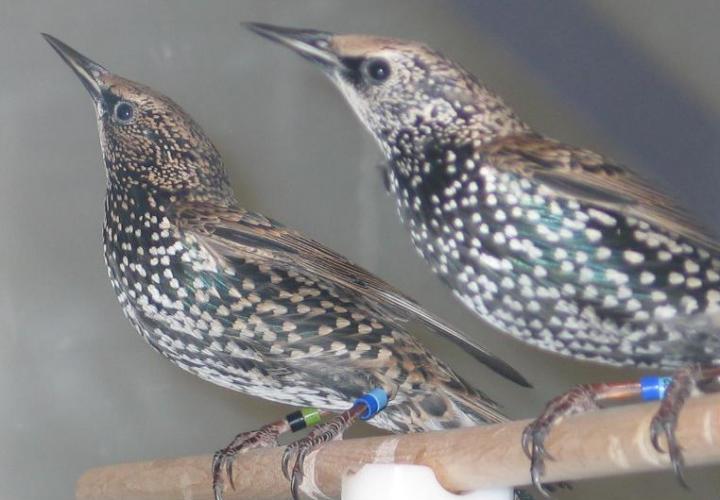
Credit: Photo courtesy of Scott McWilliams
KINGSTON, R.I. – June 18, 2020 – A research team led by a University of Rhode Island ornithologist had birds fly in a wind tunnel to simulate migration and found that birds that consume dietary antioxidants before and during fall migration can reduce the endocrine stress response triggered by long-duration flights.
The results, published this week in the Proceedings of the Royal Society B, emphasize the importance of protecting habitat with an abundance of available berries containing antioxidants at migratory stopover sites.
“This reduction in the endocrine stress response may be a major benefit birds gain in fall by eating fruits at stopover sites during migration,” said Scott McWilliams, URI professor of natural resources science, noting that many species of birds select berries containing anthocyanins, a type of dietary antioxidant present in purple-colored berries. “We know birds prefer certain berries that have lots of antioxidants.”
During long-distance flights that push birds to their physiological limits, levels of metabolic hormones called glucocorticoids become elevated to provide ready-to-use fuel to satisfy high energy demands, according to McWilliams. But prolonged exposure to glucocorticoids is detrimental and can lead to chronic stress response. The research concluded that the consumption of anthocyanin-rich food attenuates the potential stress triggered by the secretion of high levels of glucocorticoids.
“We always thought that glucocorticoids were important for birds preparing for migration, and antioxidants were there to mop up the free radicals associated with high metabolism during migration,” said McWilliams. “We tested the hypothesis that antioxidants and glucocorticoids were metabolically complimentary, that is if the birds ate anthocyanins before flying then the increase in glucocorticoids to support metabolism would be reduced.”
The study was conducted at a wind tunnel at the Max Planck Institute for Ornithology in Seewisen, Germany. Scientists from URI, the Institute, Jagellonian University in Poland and Sacred Heart University in Connecticut collaborated on the project. Funding was provided by the National Science Foundation and European grants.
The researchers chose as their study subjects European starlings, a common species in Germany that migrates to southern Italy. The test subjects were collected from nest boxes, hand-raised adjacent to the wind tunnel, and put through endurance training for two weeks prior to the experiment. Physiological measurements were then taken before and after the birds’ long-duration flights, some of which lasted up to six hours.
“The birds that ate anthocyanins prior to flying increased the level of glucocorticoids in their circulation by only about half as much as those that did not eat dietary antioxidants,” said McWilliams.
Equally important, he said, is that the birds that ate the anthocyanins “showed no other effects on their flight performance. The birds could fly for just as long, they used just as much fat, and everything else was similar. Their performance was the same, but they accomplished that performance while reducing their glucocorticoid response. The antioxidants attenuated the negative effects of the glucocorticoids.”
McWilliams believes that many species of birds benefit from feeding on berries high in antioxidants during fall migration.
“We know that lots of other species of birds switch to feeding on fruits in fall and show the same kind of preferences for certain fruits high in antioxidants,” he said. For this reason, land management and conservation efforts for migratory songbirds, especially in the eastern U.S., focuses on providing habitat with an abundance of fruiting shrubs.
While many varieties of anthocyanin-containing berries are available to birds during the fall migration season, few are available during spring migration, and little is known about how the birds cope with the high levels of glucocorticoids during their northbound flights.
“We don’t know where they get those antioxidants in spring, or if they do,” McWilliams said. “All animals have an endogenous antioxidant system, so perhaps when dietary antioxidants are less available, they rely more on this internal endogenous system.”
###
Media Contact
Todd McLeish
[email protected]
Original Source
https:/
Related Journal Article
http://dx.




